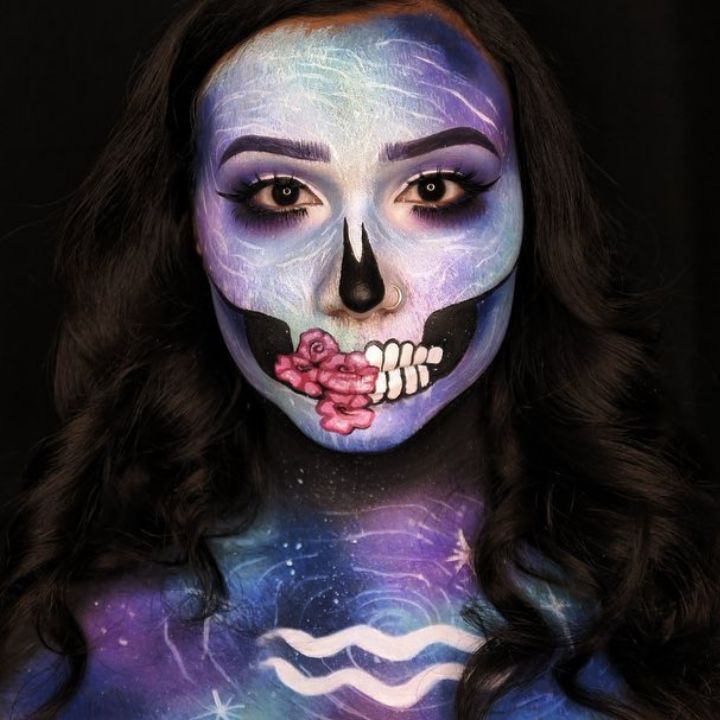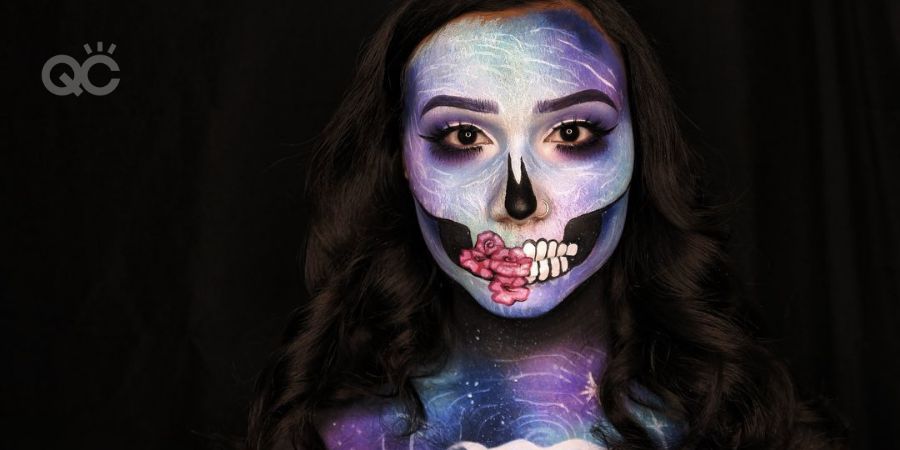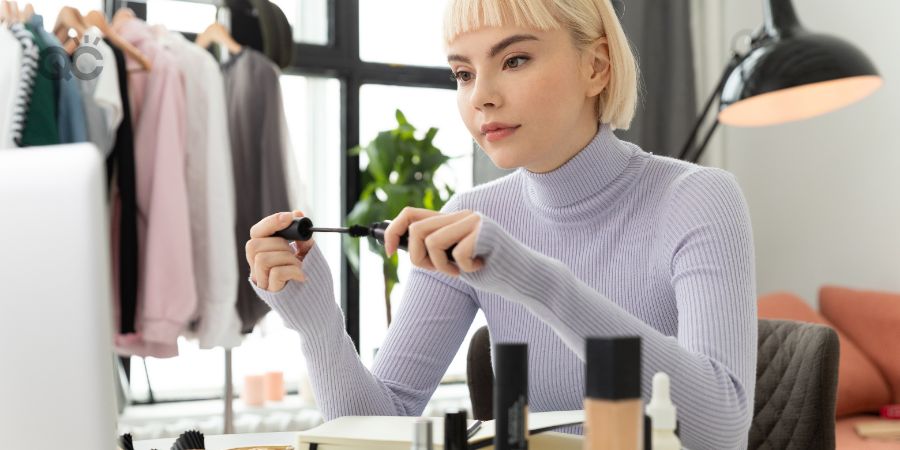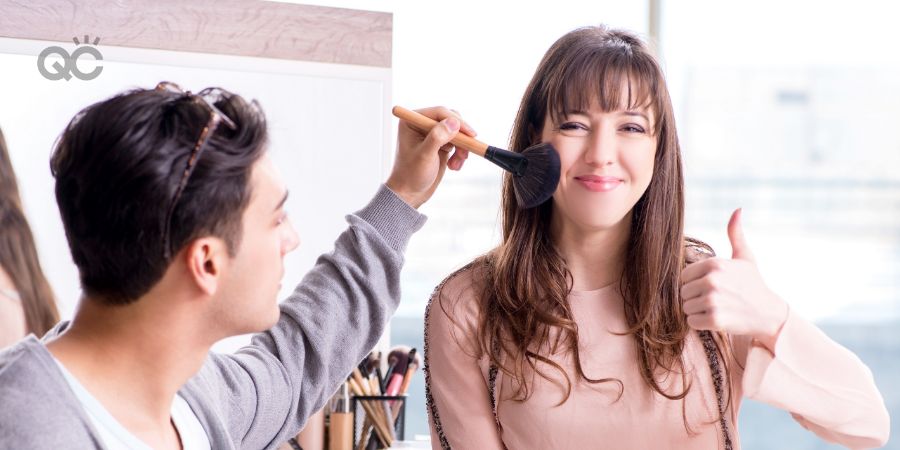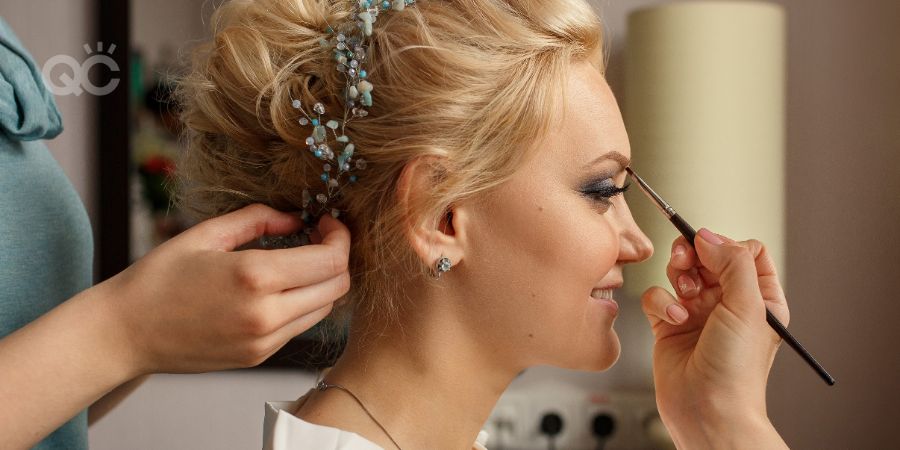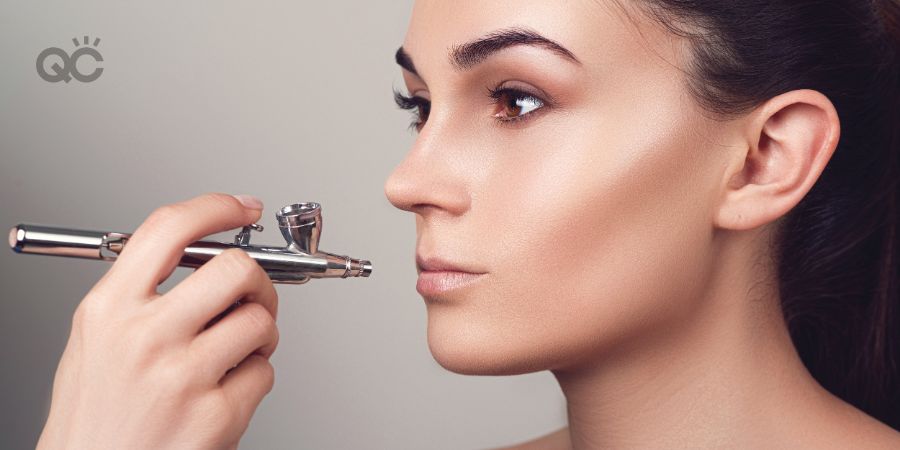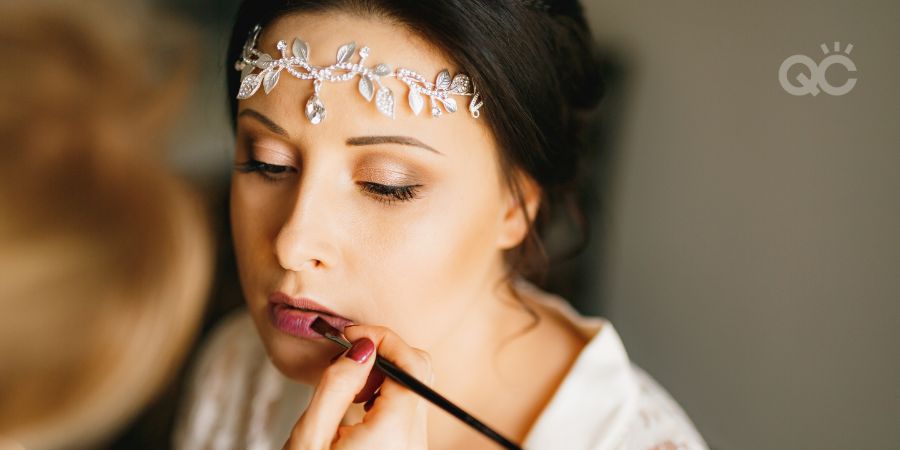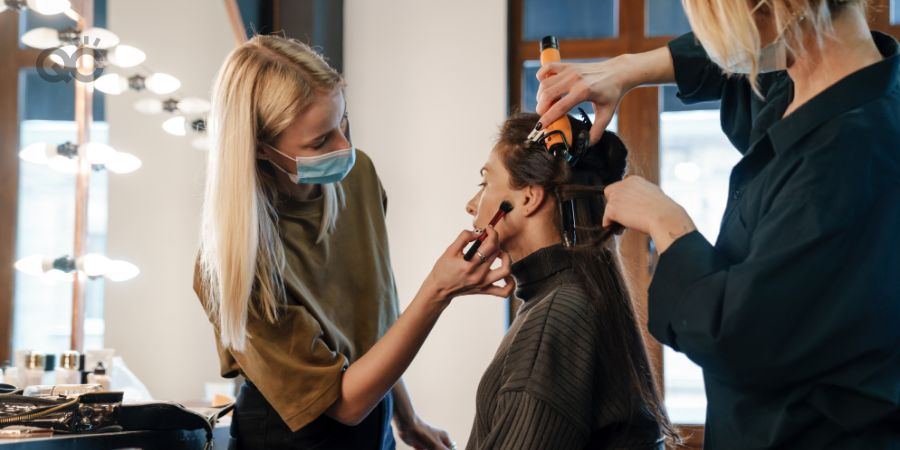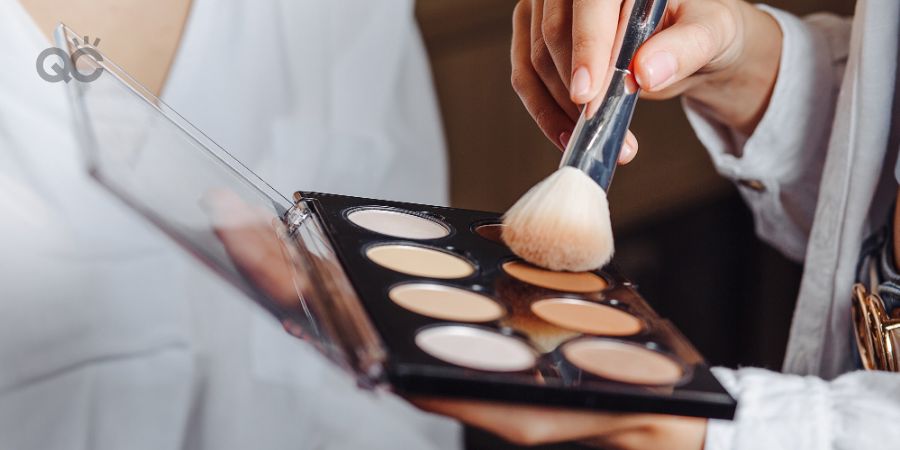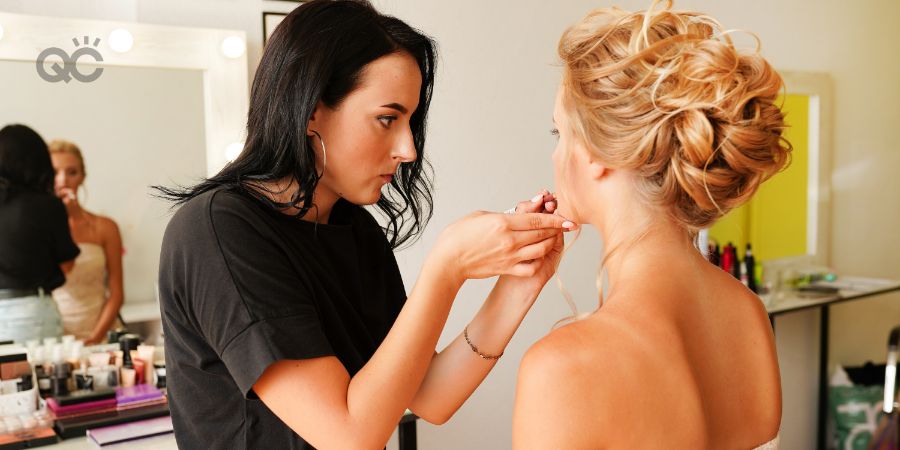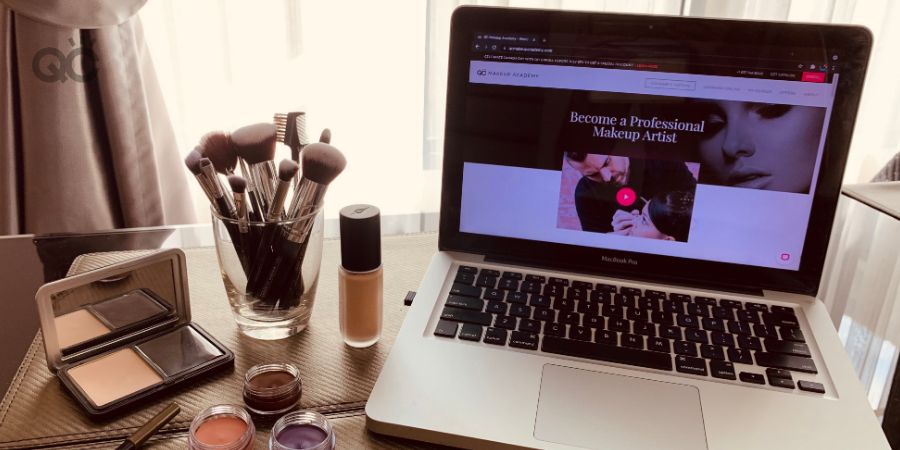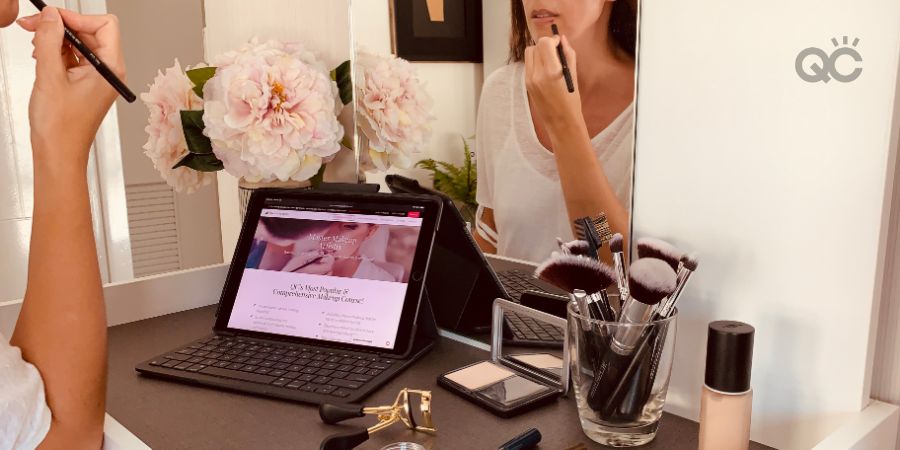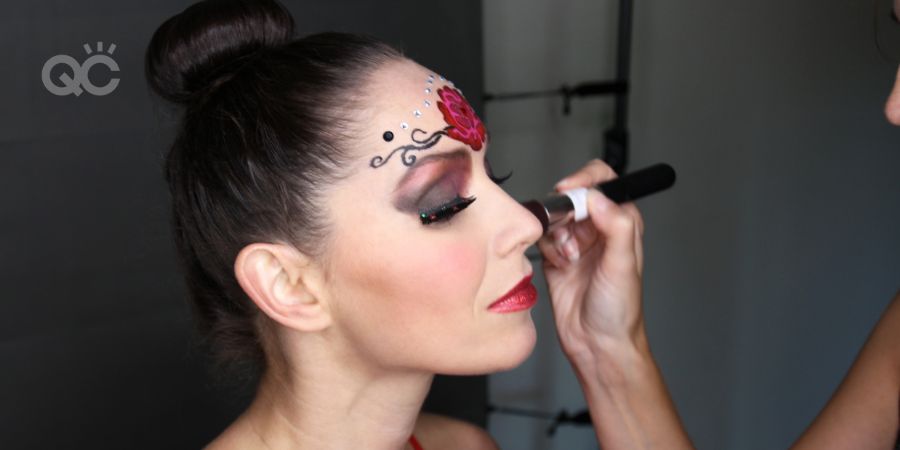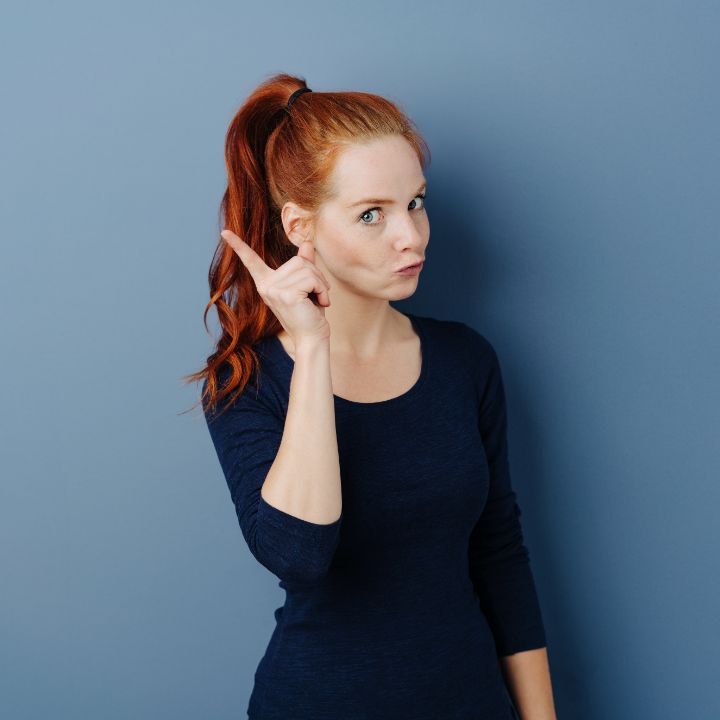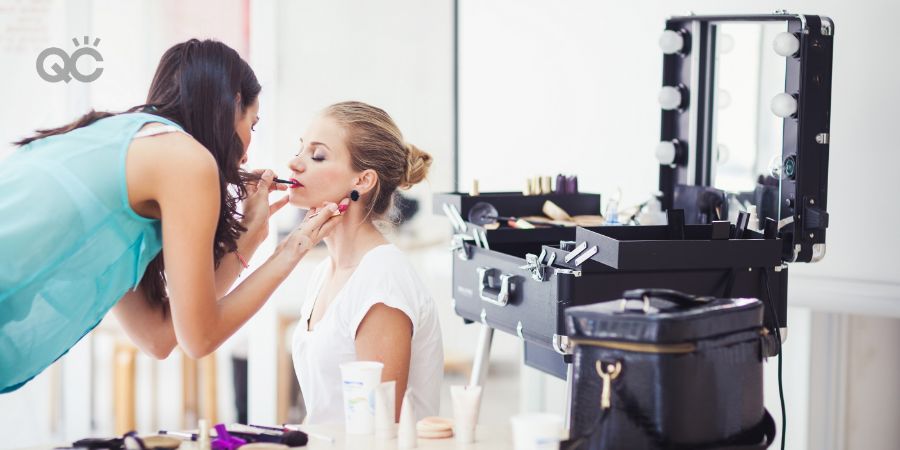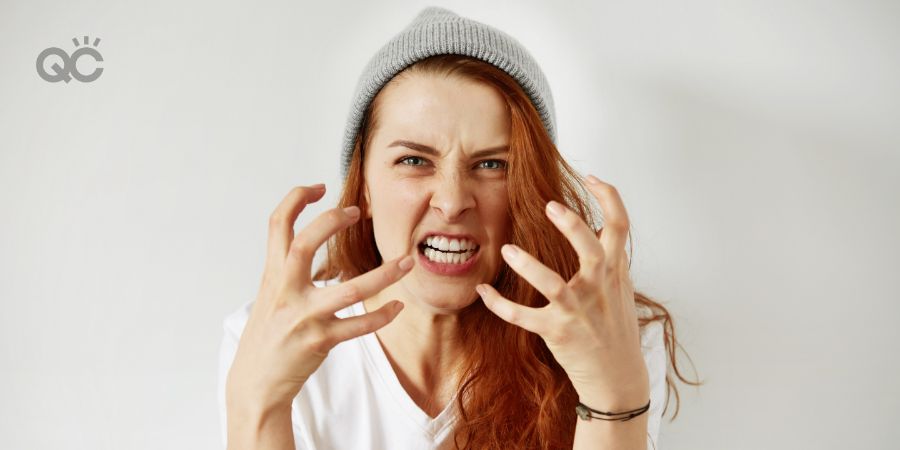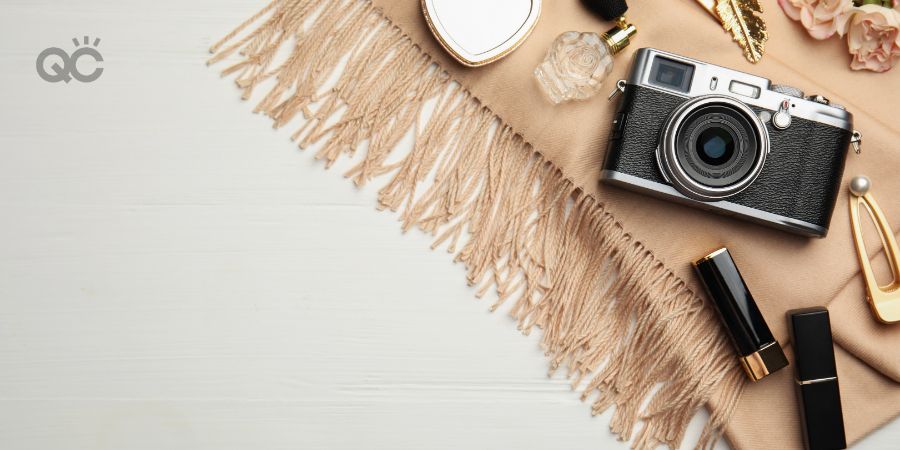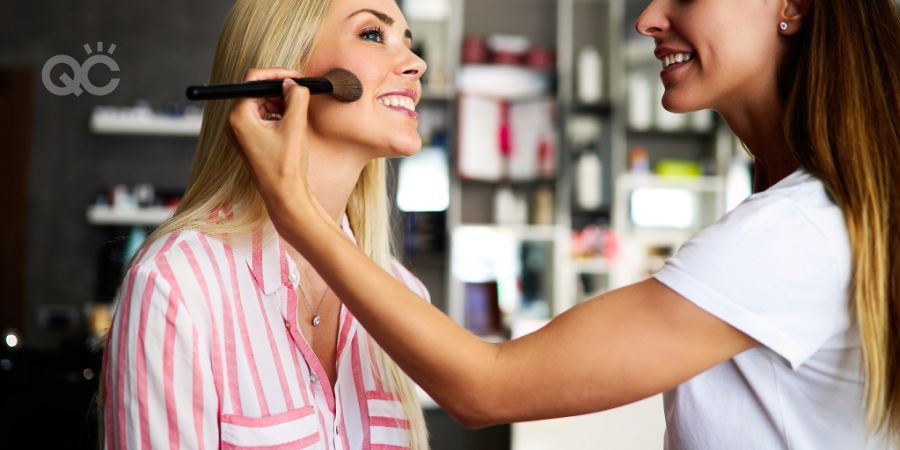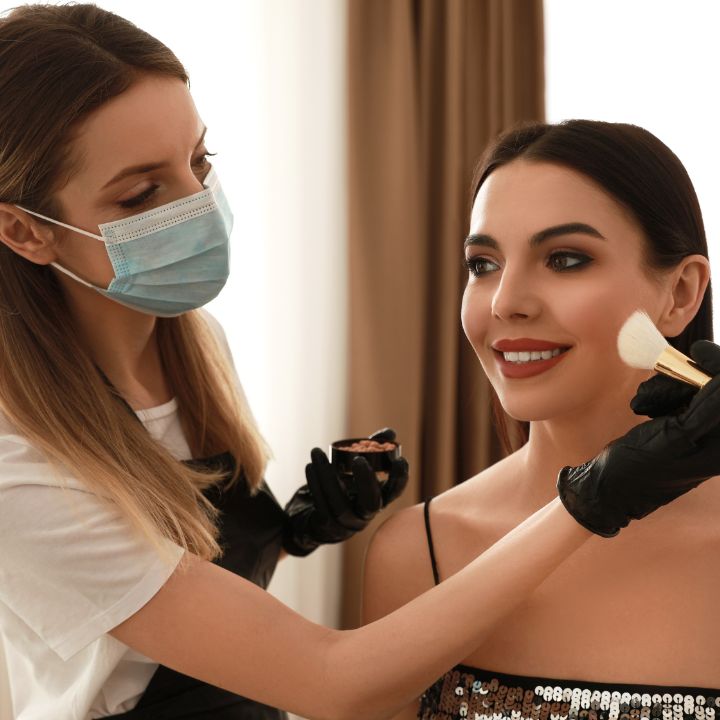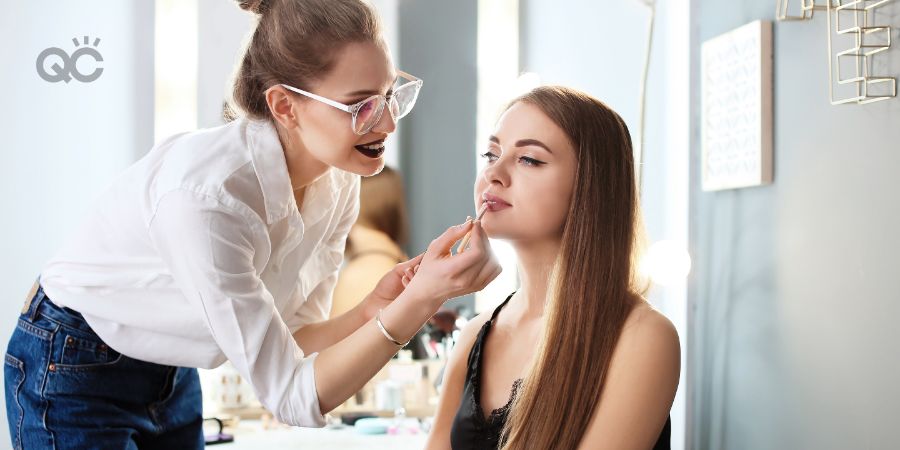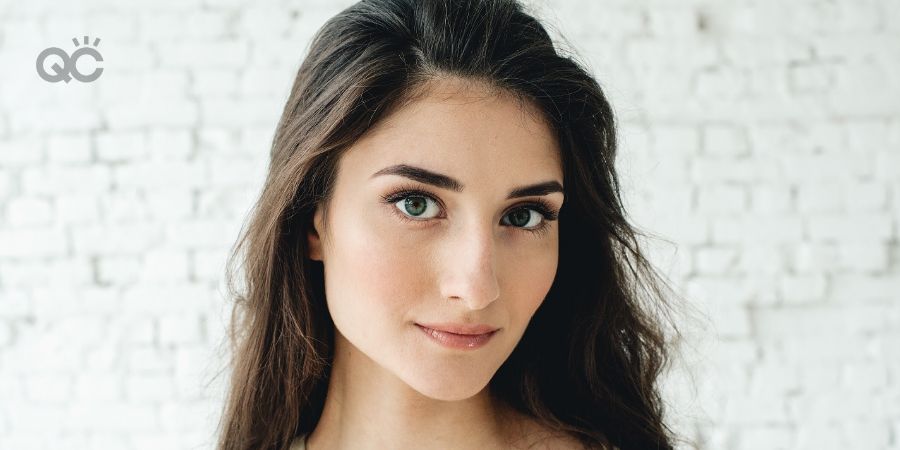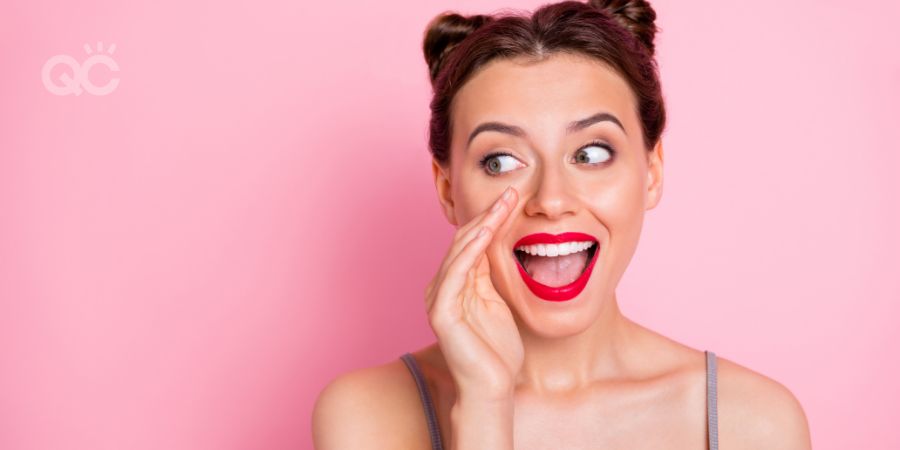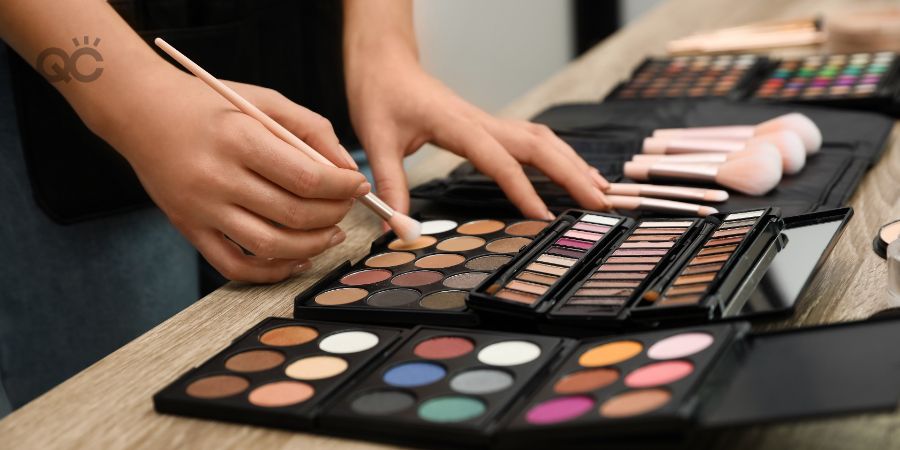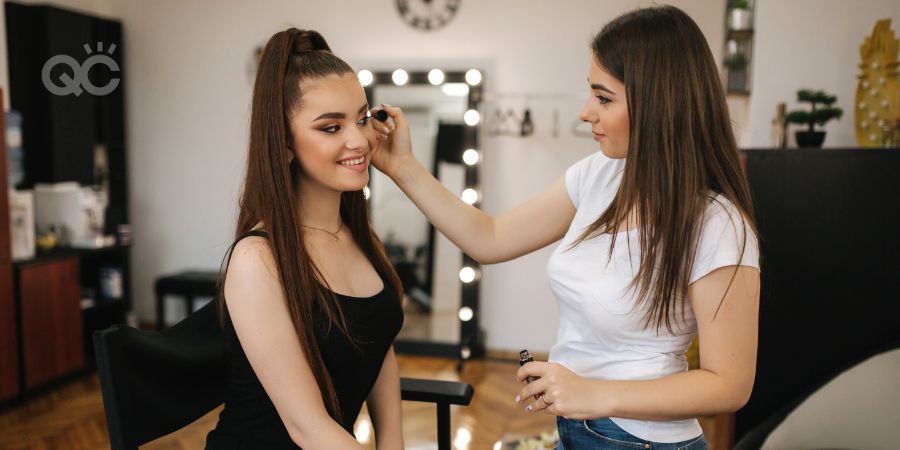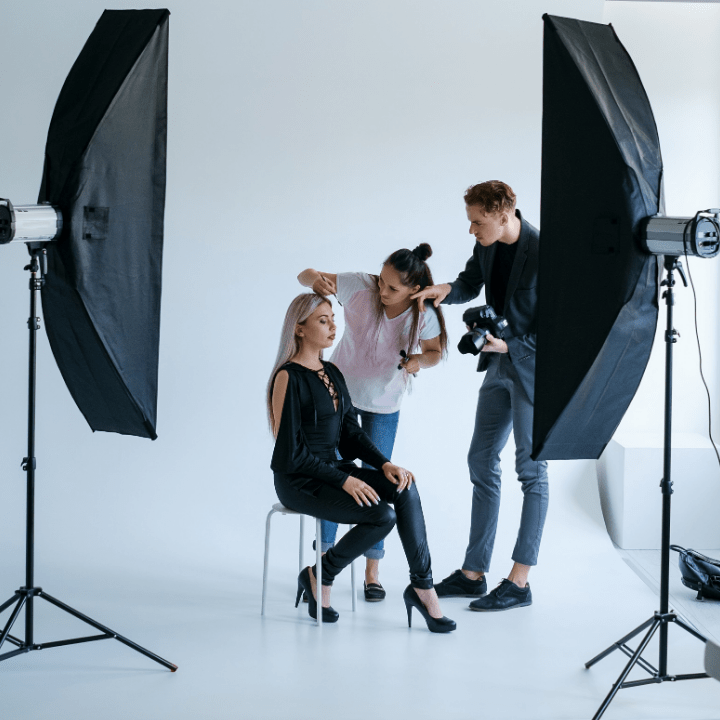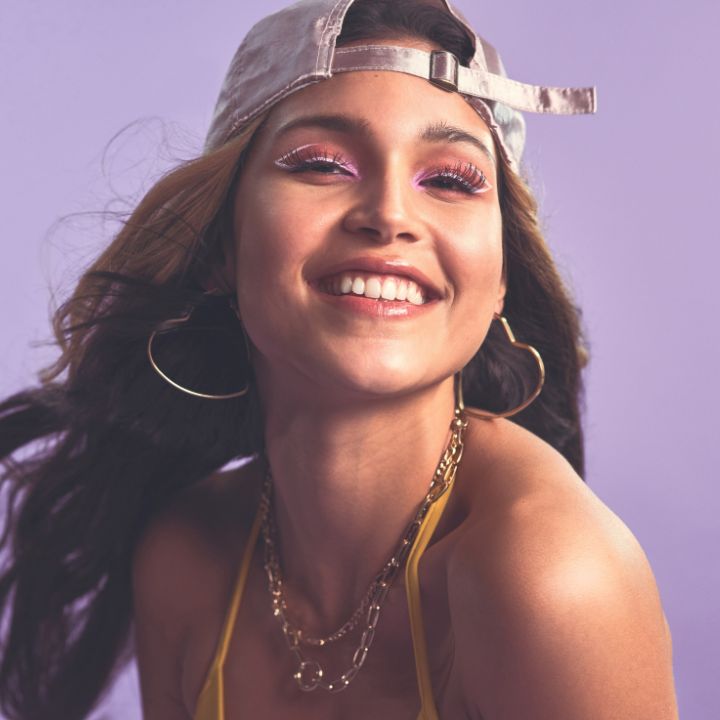
Makeup Inspiration: Key Points
- Makeup inspiration fuels creativity and career growth.
- Artists should explore diverse sources like art, film, and social media.
- Wedding makeup inspiration blends timeless and trendy looks.
- Building a strong makeup artist aesthetic sets you apart.
- QC Makeup Academy helps turn inspiration into professional artistry.
Introduction
Makeup artistry is a creative profession built on ideas, vision, and originality. Whether it’s for a client’s wedding, a fashion shoot, or a red-carpet event, every look you design starts with one spark: makeup inspiration. Inspiration shapes how you see color, texture, and style. It pushes you to experiment with new techniques, embrace trends, and refine your personal artistry.
Without it, makeup can feel routine. But with it, your work becomes expressive, professional, and unforgettable!
The beauty industry is constantly changing. Social media brings new styles every day, and fashion weeks launch bold trends each season. At the same time, timeless artistry—like natural skin, red lips, or smokey eyes—never goes out of style. For professional MUAs and students alike, learning how to find, adapt, and use inspiration is the key to staying creative and relevant.
So, keep reading to explore the ultimate guide to makeup inspiration and how it can transform your artistry!
Meet Kate Loveland, QC Student & Award-Winning, Internationally Published MUA
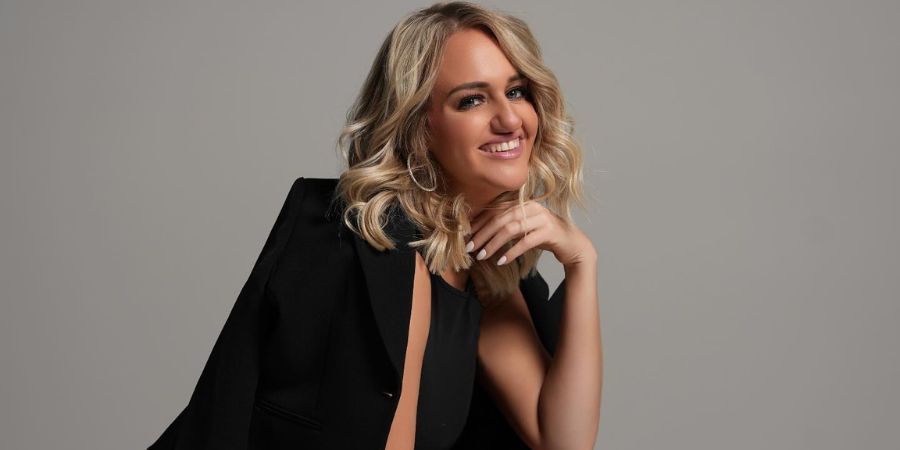
Photo by Jenn Woo Photography. Location: 43 Studios.
Kate’s passion for makeup began long before her professional career. Originally studying Clinical Laboratory Science, she followed her love of beauty and began working as a makeup artist in 2012. A QC Makeup Academy student, Kate has spent over 13 years building a versatile career spanning salons, fashion shows, pageants, film, and commercial campaigns.
She specializes in commercial makeup artistry, collaborating with brands to create everything from clean, natural looks to bold editorial styles. Owner of her own salon suite, Beauty By Kate Loveland, Kate offers full hair and beauty services while traveling nationwide for creative projects. Above all, she’s passionate about helping every client feel confident and seen—both in her chair and on set.
That said, as a proud mother of five daughters, Kate says her favorite title will always be “Mom.” ❤️
Why Makeup Inspiration Matters in Professional Makeup Artistry
Makeup inspiration is more than a mood boost—it’s the very foundation of professional makeup artistry. If you don’t have fresh ideas, it becomes easy to fall into repetitive looks. When you have the right inspiration, though, you can grow as an artist, build a unique style, and meet every client with confidence.
Creativity as the Core of a Makeup Artist Aesthetic
Your makeup artist aesthetic is what sets you apart. It’s the personal style that clients recognize and admire. Inspiration fuels this aesthetic and keeps it evolving by:
- Helping you experiment with color, texture, and shape.
- Sparking artistic makeup looks that feel fresh and modern.
- Allowing you to push beyond trends and create signature work.
- Preventing burnout and keeping your artistry exciting.
- Building your reputation as a creative professional.
And when your aesthetic is clear and confident? Clients trust you because they see your artistry as both stylish and reliable.
From Inspiration to Application: Turning Ideas into Looks
That said, finding ideas is only half the process. The real skill is turning inspiration into wearable makeup looks.
Here’s how makeup artists make it happen:
- Start with a concept (a photo, a painting, or a trend).
- Break it down into elements like colors, shapes, and textures.
- Adapt those elements into makeup techniques (eyeshadow, contour, lip design).
- Practice and refine until the look feels both artistic and functional.
- Adjust for each client’s features, personality, and occasion.
This process transforms random concepts into legitimate, professional results. Moreover, it also keeps your portfolio full of unique and inspirational makeup designs.
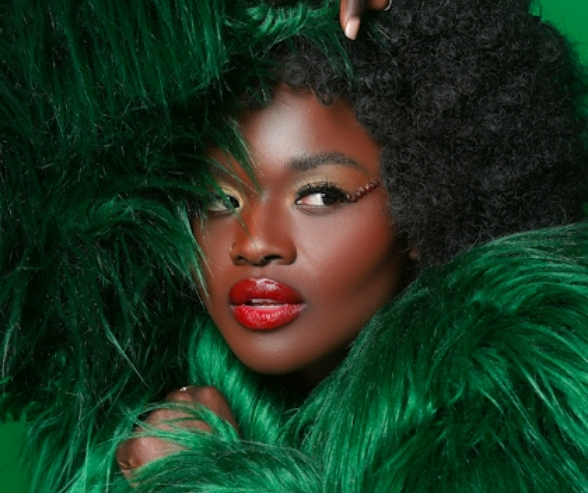
Photo and shoot organized by Jenn Woo Photography. Model: Arach Aromi.
Top Sources of Makeup Inspiration Every Artist Should Explore
Makeup inspiration comes from EVERYWHERE! As a professional or aspiring artist, you need a wide pool of influences in order to keep your artistry fresh. The more you expose yourself to creative worlds, the more ideas you’ll bring back to your own work.
Here are the most powerful sources to explore when you’re searching for makeup inspo:
1. Art, Fashion, and History as Endless Inspiration
Art and fashion have always shaped beauty standards. From the dramatic eyeliner of Ancient Egypt to the bold colors of modern runways, makeup is constantly borrowing ideas from these worlds.
How To Use These Sources In Your Artistry:
- Fine art teaches balance, symmetry, and color harmony. Study impressionist paintings to understand soft blending, or abstract works to practice bold contrasts.
- Fashion design highlights how textures and fabrics pair with makeup. Sequins, lace, or leather can inspire matching eye looks or lip finishes.
- Historical eras show you how trends evolve. Think about the flapper makeup of the 1920s, the glam of the 1980s, or the minimalism of the 1990s. Each offers lessons you can reinvent for modern clients.
- Museums and galleries allow you to train your eye for detail. Observe how artists use light, shadows, and lines, as these are the same principles you apply in contouring and highlighting.
- Fashion magazines and couture shows show how makeup interacts with clothing. This is especially valuable if you want to work in editorial or runway artistry.
2. Film, Theater, and Pop Culture Trends
Cinema and pop culture are also goldmines for inspiration! Think about the impact of Marilyn Monroe’s red lip, Twiggy’s iconic lashes, and Lady Gaga’s avant-garde stage looks. Film and performance art show you how makeup can create characters, moods, and cultural moments.
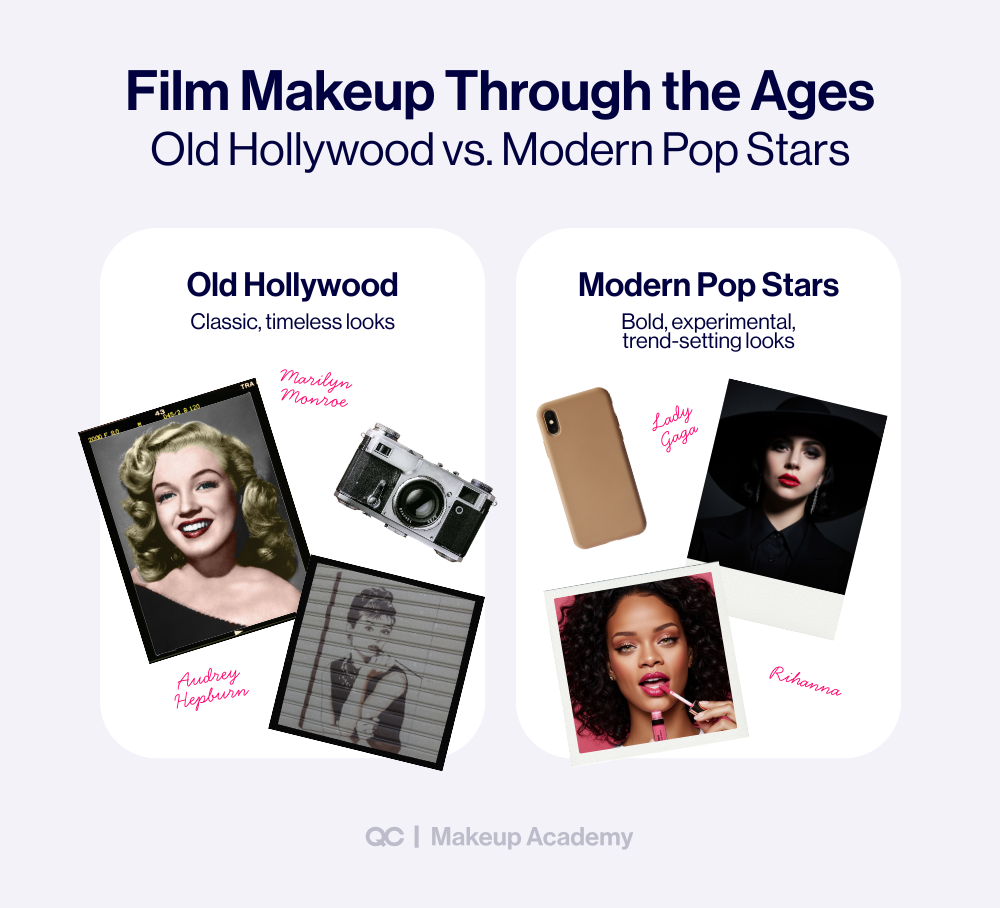
Ways To Draw Inspiration:
- Cinematography: Pay attention to color palettes in films. Romantic comedies often use soft pinks and neutrals, while action movies lean on smoky, moody tones.
- Theater: Stage makeup is exaggerated so it can be seen from a distance. Even if you’re not doing theater work, studying these techniques helps you learn about bold shapes, strong liners, and impactful designs.
- Pop stars and celebrities: Music videos and award shows are full of experimental styles. These often trickle down into everyday beauty trends.
- Fantasy and sci-fi films: These genres push boundaries with face paint, prosthetics, and SFX. Studying them improves your range as an artist.
- Cultural icons: Think of how the Kardashians influenced contouring or how Euphoria inspired a wave of glitter and graphic eyeliner. Pop culture sets trends faster than almost any other medium.
3. Social Media & Digital Platforms (Instagram, TikTok, Pinterest, etc.)
Social media is THE fastest-moving source of creative makeup inspo. But while it’s undoubtedly inspiring, it can also feel overwhelming at the same time. That’s why curation is key!
Based On The Social Media Platform:
- Instagram: Follow real makeup artists, not just influencers. Look for accounts where MUAs post unfiltered, professional work. Avoid MUAs who filter themselves and/or their videos.
- TikTok: Trends like “strawberry makeup” or “clean girl aesthetic” go viral here. TikTok is also where Gen Z is reshaping beauty standards.
- Pinterest: While AI images have flooded the platform, it’s still valuable for building mood boards. The trick is to mix real-world MUAs with editorial inspiration.
- YouTube: Long-form tutorials help you learn how looks are built step by step. This deepens your technical skills while giving you visual references.
- Emerging tech: AI tools like MidJourney or makeup filter apps can spark creativity. Even if you don’t copy the exact image, they can give you a starting point.
Tips For Using Social Media Wisely:
- Refresh your feed every few months to avoid repetitive looks.
- Save only what feels unique to your makeup artist aesthetic.
- Don’t fall into copying. Always use other people’s posts as springboards, not templates.
- Balance viral trends with timeless artistry to avoid becoming dated.
4. Celebrity Red Carpet and Editorial Looks
Celebrities drive trends across the globe. Their makeup is literally designed to be photographed, studied, and replicated. That makes celebrity beauty a perfect source for both everyday artists and pros working in fashion or bridal makeup.
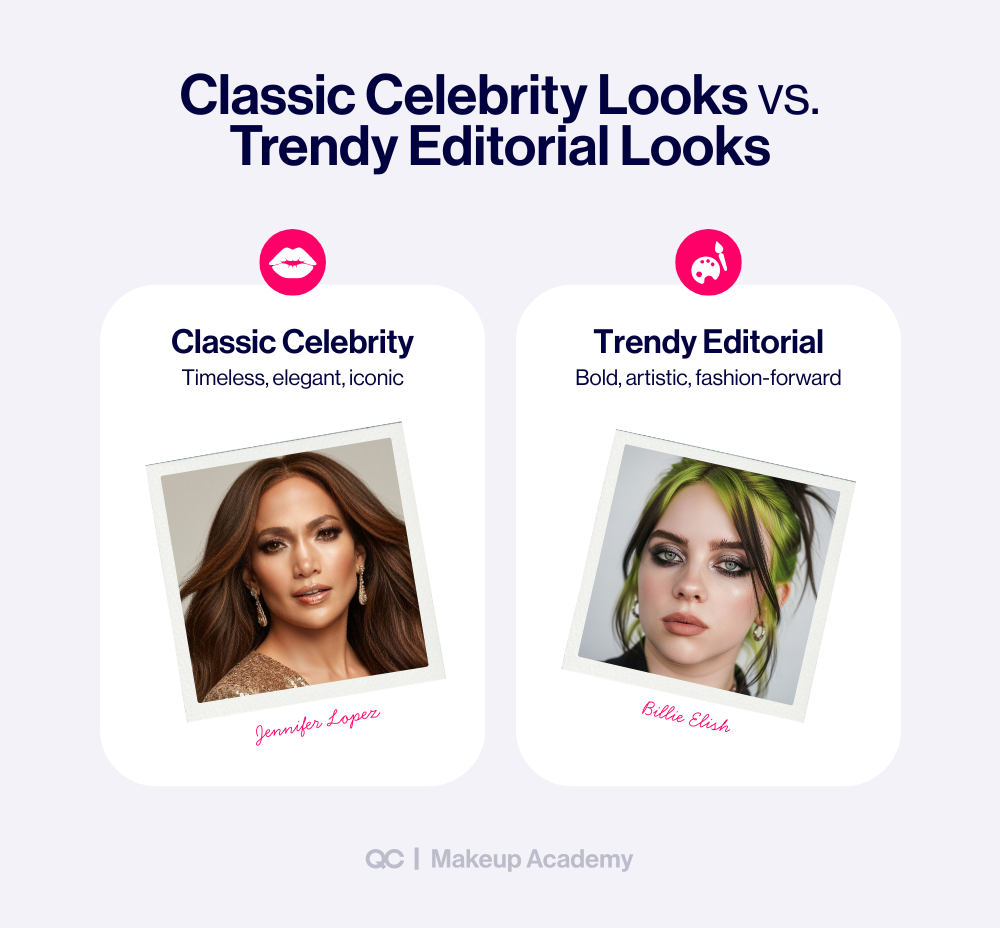
Where To Look For Inspiration:
- Red carpet events: Think Oscars, Met Gala, Grammys, etc. Each one showcases polished and innovative artistry.
- Editorial spreads: Fashion magazines like Vogue or Harper’s Bazaar feature artistic makeup looks paired with high-end styling.
- Celebrity weddings: From Meghan Markle’s natural bridal makeup to Priyanka Chopra’s glam, celebrity brides influence thousands of wedding looks.
- Interviews and BTS content: Many MUAs for celebrities now share product lists, techniques, and behind-the-scenes insights online.
- Influencers and ambassadors: Stars who represent major beauty brands often showcase trend-forward looks.
Why This Matters:
- Clients often bring celebrity photos to trials as references.
- Studying these looks trains your eye for balance and proportion.
- Celebrity makeup is where artistry meets mainstream demand.
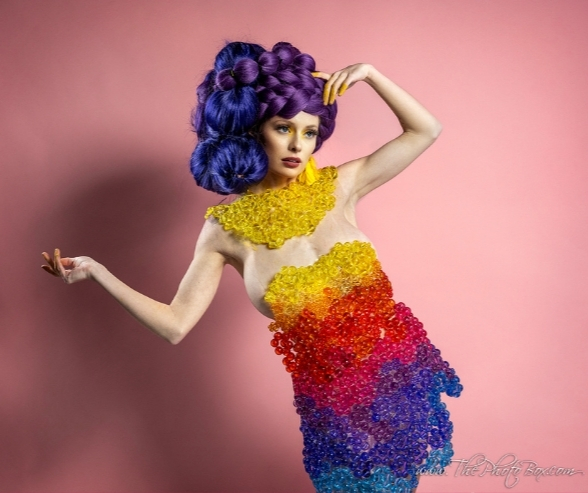
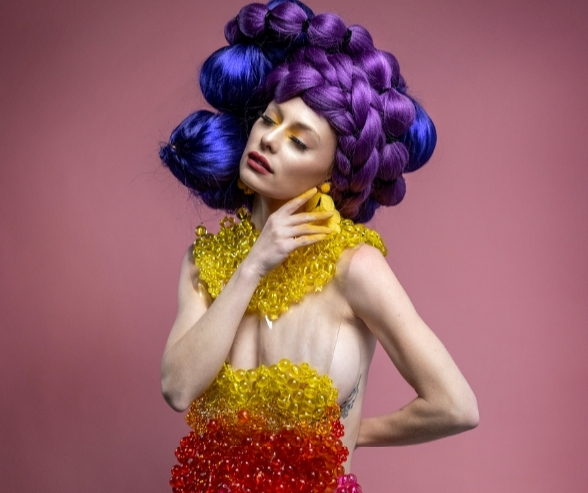
Photos by Scott Gianchetta. Dress designed by La Adorna.
5. Runway & Global Fashion Weeks
If you want to see the future of makeup, simply look at the runway! Fashion weeks are where makeup artistry goes from idea to movement.
How Runway Shows Fuel Professional Makeup Artistry:
- Bold experimentation: Makeup is often theatrical, with colors and shapes that wouldn’t appear in everyday life.
- Trend forecasting: Techniques like glazed skin, neon liner, or bleached brows often appear here first BEFORE becoming mainstream.
- Collaboration: Makeup is paired with clothing, hair, and staging to create a full aesthetic.
- Global perspective: Paris, Milan, New York, Tokyo—each fashion capital has a different approach, offering fresh ideas.
- Skill development: Watching runway makeup teaches you how to balance avant-garde creativity with technical precision.
Practical Ways To Learn From Runways:
- Watch livestreams or photo galleries from each season.
- Follow MUAs who work backstage for insights and tutorials.
- Practice recreating runway looks, then adapt them into client-friendly versions.
- Study how makeup enhances the overall show theme, not just the model’s face.
Get Makeup Inspiration + The Skills To Go Pro
Receive hands-on training right from the comfort of home with QC Makeup Academy!
Wedding Makeup Inspiration and Client Work
Bridal beauty is one of the most important areas for makeup artists to master. Brides want to look like the best version of themselves on their wedding day, and they often come armed with photos of celebrities, Pinterest boards, or TikTok screenshots. That’s why every artist should understand wedding makeup inspiration, too—where it comes from, how to use it, and how to adapt it for each unique client.
Whether you specialize in weddings or just take bridal bookings occasionally, knowing how to balance classic and trendy inspiration can make the difference between a satisfied client and a lifelong fan!
Natural, Glowy, and Timeless Looks
Many brides request a “natural but polished” style. This type of wedding makeup inspiration NEVER goes out of fashion!
Key Elements Of Natural Bridal Looks:
- Skin: Lightweight foundation, sheer coverage, radiant finish.
- Cheeks: Soft pink or peach blush for a healthy glow.
- Eyes: Neutral shadows, subtle shimmer, softly blended liner.
- Brows: Groomed but natural, brushed upward for definition.
- Lips: Nude, rose, or sheer gloss to enhance natural tones.
Why It Matters:
- Timeless makeup photographs beautifully across decades.
- Brides often want to recognize themselves in their wedding photos.
- Glowy skin reads fresh and elegant under different lighting conditions.
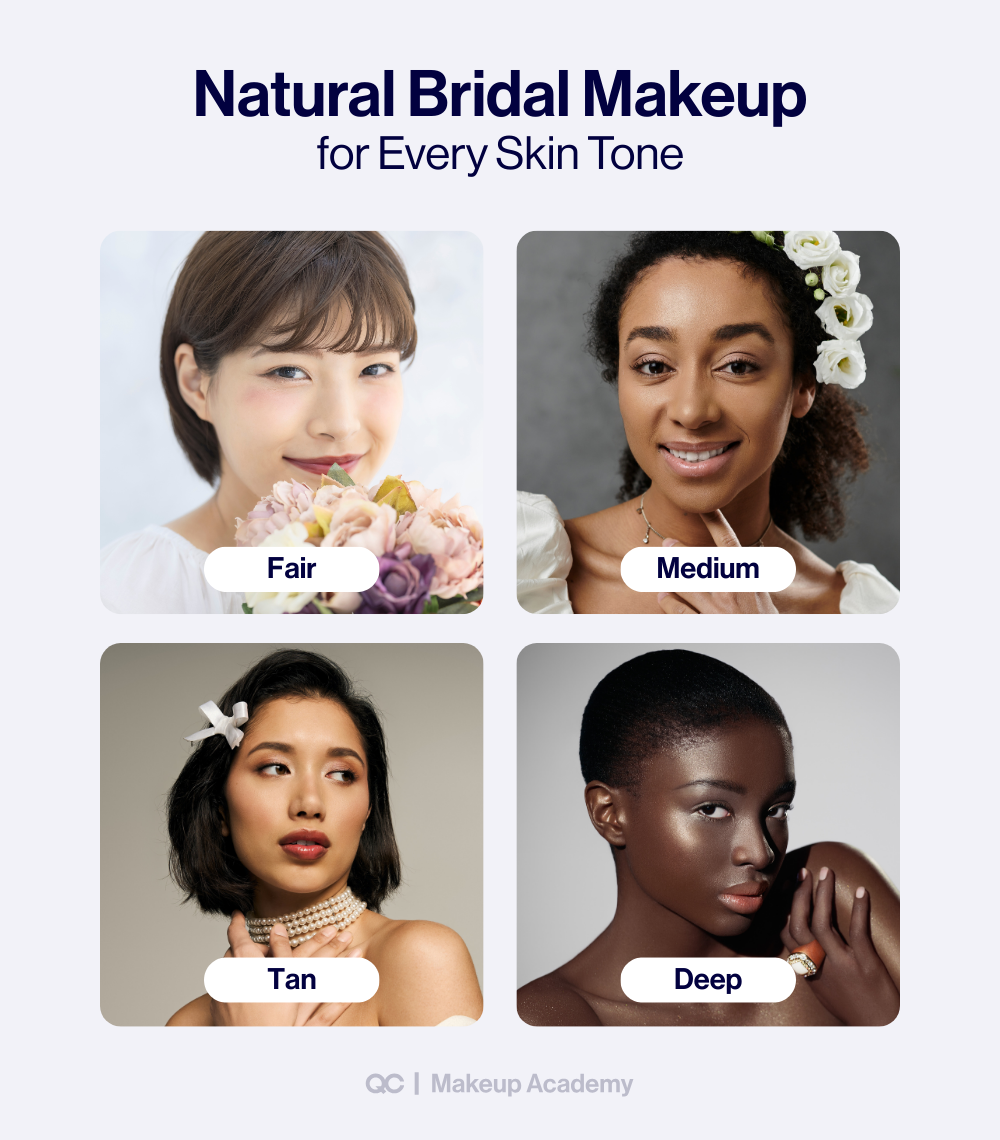
Bold Lips, Statement Eyes, and Modern Glam
With that said, not every bride wants soft glam. Some want to make a statement with color, shimmer, or bold definition! This is where artistic makeup looks meet bridal beauty.
Examples Of Bold Bridal Inspiration:
- Bright or deep lipstick shades (red, berry, coral, or fuchsia).
- Smokey eyes with brown, plum, or charcoal tones.
- Graphic liner or winged eyeliner for extra drama.
- Shimmering lids in gold, bronze, or metallic hues.
- Full lashes (extensions or strip lashes) to frame the eyes.
Why It Matters:
- Bold details personalize a bridal look and make it unforgettable.
- Fashion-forward brides look for makeup inspo creative ideas that stand out on Instagram or in editorial-style wedding photography.
- This approach lets MUAs demonstrate technical skill while still balancing wearability.
Adapting Inspiration to Client Preferences
This is the TRUE test of professional makeup artistry: taking inspiration and reshaping it for a real person. Think about it: brides often bring references that don’t exactly match their features, skin tone, or wedding vibe. Therefore, a skilled artist needs to know how to translate those ideas into something that’s still both flattering and personal.
Tips For Adapting Inspiration:
- Ask guiding questions: What do they love about the inspiration photo (e.g., color, texture, or mood)?
- Consider the setting: Outdoor weddings need long-wear, heat-resistant looks; indoor evening weddings can handle more drama.
- Adjust for features: A smokey eye for deep-set eyes won’t be the same as one for round eyes.
- Customize shade ranges: Match inspiration colors to the bride’s undertones.
- Balance with personality: A minimalist bride may love a bold lip on Instagram but regret it in her wedding album.
It Matters Because It:
- Shows professionalism and artistry beyond copying.
- Builds client trust since they feel heard and understood.
- Results in makeup that looks like them, not just a picture they found online.
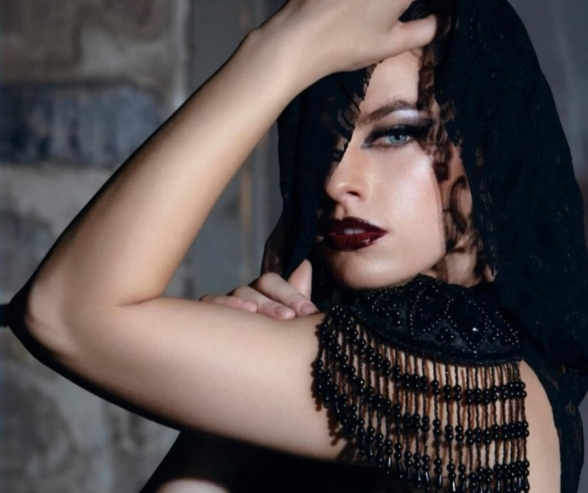
Photo by Tawny Horton. Model: Catherine Cornaby.
Why Wedding Makeup Inspiration Builds Careers
Bridal work is not just about one day—it’s about building your reputation as an artist. Happy brides recommend you to friends, family, and photographers. Plus, they often post photos that tag you on social media, giving you more visibility.
- Brides search online for “wedding makeup inspiration” every day. Ranking high in this niche gives you an edge!
- By showcasing both timeless and trendy looks, you appeal to a wide range of clients.
- Wedding makeup work builds a strong portfolio that can also lead to editorial and commercial gigs.
- It allows you to develop your makeup artist aesthetic by blending client needs with your own artistry.
Building Your Own Makeup Artist Aesthetic
Every great makeup artist has a recognizable style. This is your makeup artist aesthetic: the unique blend of colors, techniques, and creative touches that make your work stand out from everyone else. While inspiration comes from many sources, the way you use it builds your professional identity. Clients hire you not only for your skills, but also for your artistic voice.
Developing your aesthetic takes time, practice, and intention. So, here’s how you can shape it, step by step!
Step 1: Develop Your Signature Style
Your signature style is like your artistic fingerprint. Meaning, it shows up in every look you create, from bridal to editorial.
Tips For Developing Your Aesthetic:
- Firstly, identify what excites you most. Do you gravitate toward soft glam, bold color, or high-fashion drama?
- After that, notice your habits. What eyeliner shape do you naturally use? What lip finishes do you prefer? These patterns reveal your style.
- From there, experiment widely. Try EVERYTHING—graphic liner, avant-garde SFX, natural skin. Over time, your favorite elements will blend into your aesthetic.
- Next, get feedback. Ask mentors, peers, or clients what stands out in your artistry. Sometimes others notice your aesthetic before you do.
- Finally, refine your portfolio. Choose photos that highlight your strengths, not just every look you’ve ever done.
Why This Matters:
- For starters, clients trust artists with a clear style because they know what they’ll get.
- Not to mention, a strong aesthetic sets you apart in a crowded market.
- Furthermore, it also positions you as both creative and professional.
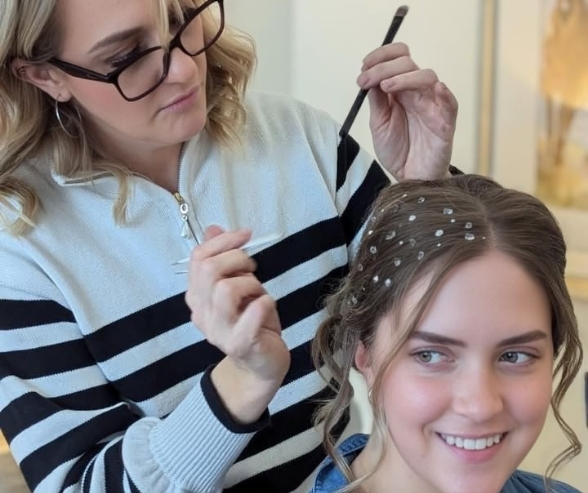
Client: Live watercolor artist, Kelsey Fisher.
Step 2: Put Together Inspiration Boards, Mood Boards, and Portfolios
Once you’ve identified your style, you then need tools to refine and showcase it. This is where makeup inspo creative boards and professional portfolios come in.
How To Use Boards and Portfolios Effectively:
- Inspiration boards: Collect images that spark your creativity. Think artwork, landscapes, fabrics, editorials, even architecture. Not everything has to be makeup-specific.
- Mood boards for clients: Create boards for bridal, editorial, and everyday beauty looks. Show clients how you adapt inspiration into real-life artistry.
- Digital tools: Use Pinterest, Canva, or Milanote to organize visuals. For portfolios, platforms like Instagram or personal websites work best.
- Update regularly: Your style evolves. Refresh your boards and portfolio at least every season.
- Show range with cohesion: Your portfolio should prove you can adapt but still feel consistent.
Why This Matters:
- It gives structure to your creativity.
- Clients and employers see your vision at a glance.
- It keeps you motivated and prevents creative blocks.
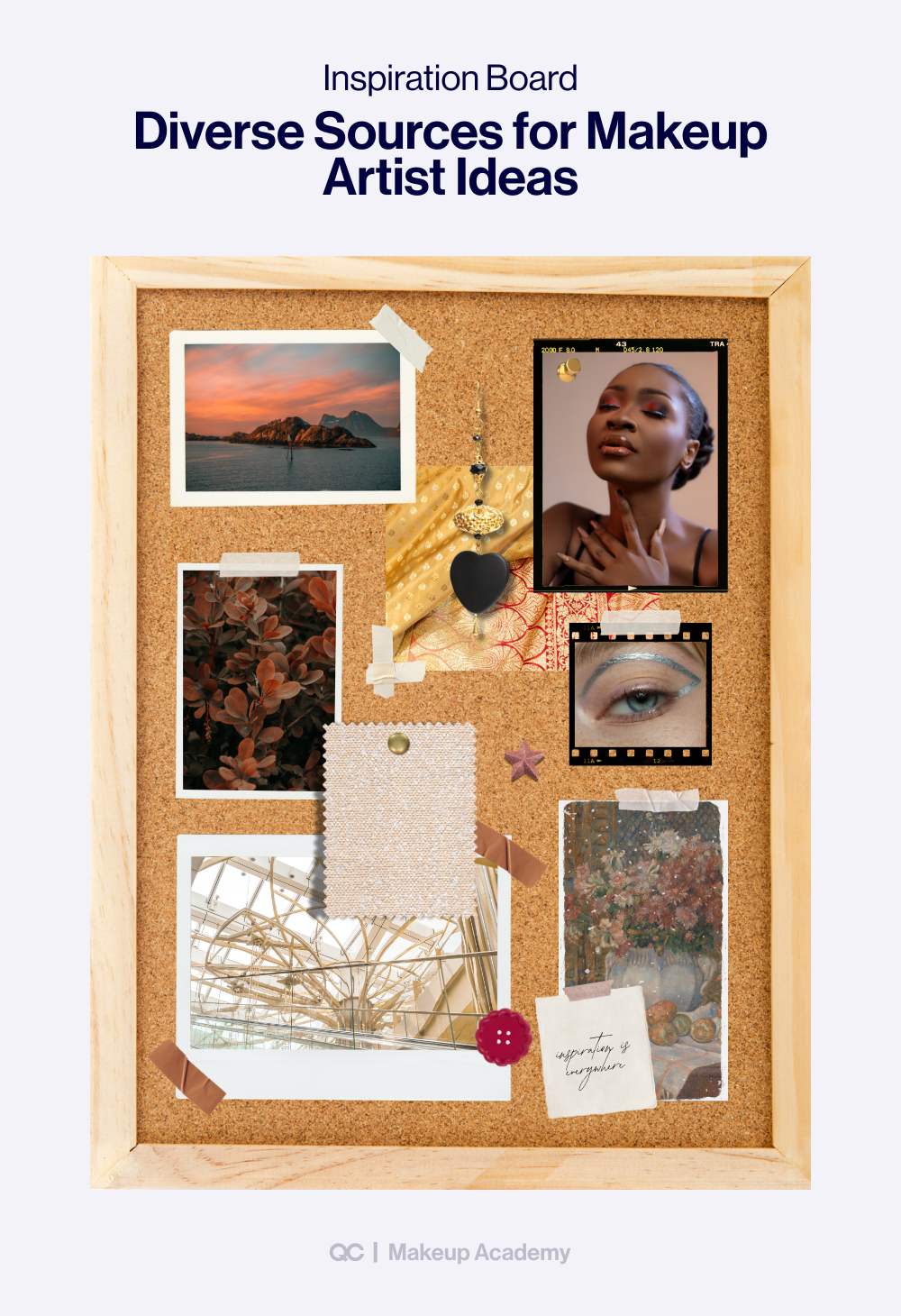
Step 3: Evolve with Trends While Staying Authentic To Yourself
Here’s a little secret: every artist struggles with balancing originality and trends. For instance, clients may sometimes request viral TikTok looks or Pinterest styles that don’t align with your aesthetic. The key here is to adapt trends without losing your voice.
Tips For Balancing Trends and Authenticity:
- Learn the trend thoroughly. Understand what makes it appealing (color scheme, technique, vibe).
- Adapt it to your style. Keep the elements that align with your aesthetic, adjust the rest.
- Practice trend translation. For example, if your style is natural, try a softer version of a bold graphic eyeliner trend.
- Stay selective. Not every trend deserves a place in your artistry. Choose those that strengthen your brand.
- Keep your roots. Your aesthetic is your anchor; it makes your artistry timeless even when trends fade.
Why This Matters:
- Keeps your work relevant and current.
- Prevents you from becoming a “trend chaser” without a personal style.
- Builds your reputation as an adaptable, innovative artist.
Why Aesthetic Development Builds Careers
Your makeup artist aesthetic is more than personal style; it’s a career-building tool. This is because it:
- Makes your work recognizable in a crowded industry.
- Attracts clients who share your taste and trust your expertise.
- Strengthens your brand for social media, websites, and portfolios.
- Positions you for opportunities like editorials, weddings, and collaborations.
- Allows you to confidently market yourself as both a creative and a professional.
In short, developing your aesthetic is how you turn inspirational makeup into a lasting career identity.
Makeup Inspiration: Expert Tips To Help You Grow
Learning how to find and use inspiration is just as much about consistency and professionalism as it is about creativity. The most successful MUAs out there know how to take sparks of makeup inspo and turn them into polished looks that clients love!
At QC Makeup Academy, our instructors and experts guide students through every stage of their artistic journey. Here are some expert-backed tips to fuel your creativity and sharpen your professional makeup artistry.
Tip 1 – Look Beyond Makeup for Inspiration
The world around you is your best classroom! For instance:
- Taking a walk through a city can inspire graphic liner shapes from architecture.
- Perusing a flower market can spark new color combinations.
- Reading a fashion magazine can highlight textures that translate beautifully into eyeshadow looks.
- Even food styling, such as the sheen of chocolate or the shimmer of sugar, can inspire unique finishes.
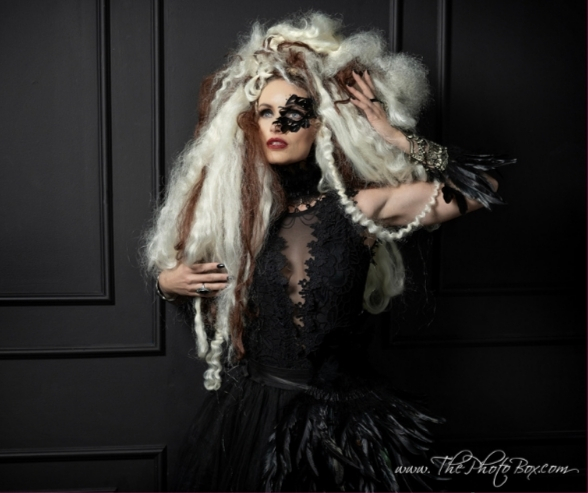
Photo by Scott Gianchetta. Shoot organized by Jennifer Woo.
Tip 2 – Build a Habit of Observation
Professional makeup artists train their eyes daily. The more you notice, the easier it becomes to spot new ideas. So, here are a few things you can to build a habit of observation:
- Carry a small notebook or use your phone to snap inspiration photos.
- Ask yourself: Why do I like this look? Is it the color, the shape, or the emotion it gives?
- Challenge yourself to find one new inspiration every day, no matter how small.
- Practice replicating looks, then adapt them into your own makeup artist aesthetic.
Tip 3 – Stay Grounded in Technique
Creativity is essential, but execution matters just as much. Professional MUAs know that inspirational makeup is only successful when the technique is flawless—and here are some core techniques we encourage you to remember:
- Blend thoroughly, as harsh lines can distract from the artistry.
- Choose colors that work for your client’s undertones, even if inspired by bold palettes.
- Use products that are long-wear and photo-friendly for bridal or event work.
- Pay attention to skin prep. Glowing skin is the canvas for most artistic makeup looks.
- Always test new techniques before applying them on clients.
Think of it this way: foundational makeup techniques create the canvas, and your inspiration + execution is the actual creation of the art upon it. Without the canvas, however, you can’t physically bring your art to life… And this is why learning professional makeup and taking a certification course is SO important for your skill-set!
Tip 4 – Keep Your Portfolio Fresh and Relevant
Contrary to what you might think, inspiration doesn’t stop once a look is created. Rather, it continues through how you present your work. This is why professionals constantly update their portfolios to reflect their current skills and aesthetic.
- Swap out outdated styles for your newest looks.
- Organize your portfolio by themes (bridal, editorial, bold, natural).
- Include both classic and trend-driven examples to show range.
- Add behind-the-scenes photos or inspiration boards to show your creative process.
- Share your work consistently on platforms like Instagram and TikTok.
Tip 5 – Expert Guidance Matters
On top of arming you with the foundation you need to express yourself, grow, and succeed, learning directly from experienced professionals also gives you confidence. Certification training ensures that your artistry evolves in a way that’s creative, ethical, and client-focused. At QC Makeup Academy, students not only gain technical skills; they also receive detailed, personalized feedback from mentors who’ve worked at the highest levels of the industry.
This is what sets apart a hobbyist from a true professional makeup artist: the ability to transform inspiration into artistry with precision, originality, and confidence.
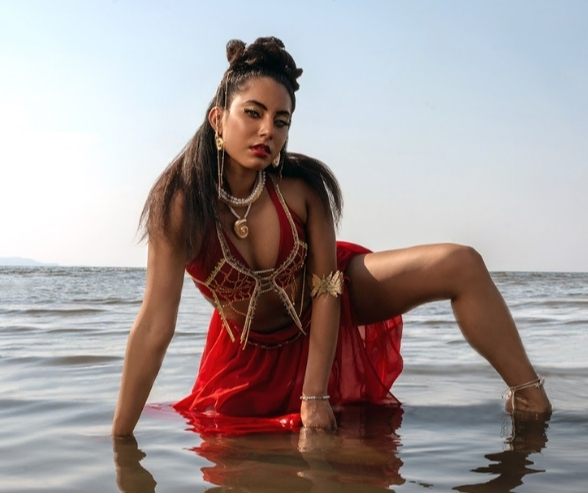
Photo by Tré Nelson Photo. Model: Nella Zepeda. Shoot organized by Utah Creative Collaborations.
Food for Thought: Take Your Makeup Inspiration Further with Training
Inspiration is the lifeblood of artistry. It pushes you to try new colors, explore new textures, and imagine looks that no one else has thought of yet. From natural bridal styles to bold editorial creations, every masterpiece begins with a single spark of makeup inspiration.
That Said, Inspiration Alone Often Isn’t Enough…
To turn those ideas into polished, professional results, you need the right training and support. That’s where QC Makeup Academy comes in!
Our online courses are designed to help you:
- Master the fundamentals of professional makeup artistry.
- Refine your techniques so your creative ideas shine through.
- Build a portfolio that showcases your unique makeup artist aesthetic.
- Gain confidence through feedback from seasoned instructors.
- Know the ins and outs of launching (and running) a successful makeup artistry business.
- Transform passion and inspiration into a successful, lasting career.
So, whether your dream is to work in weddings, fashion, film, or everyday beauty, QC will give you the tools and mentorship to make it happen!
”Studying with QC Makeup Academy has been an amazing journey. I've wanted to study makeup for over 20 years—and now I've finally done it! After two decades working backstage in TV, fashion weeks, bridal and education doing hair, I'm so excited to now offer my other big passion: makeup!
Grethe SagmoenAward Winning Stylist & Educator
Ready to elevate your artistry? Enroll in QC Makeup Academy’s self-paced online makeup courses today, and turn your inspiration into a professional career!
FAQs About Makeup Inspiration
Bringing your creativity to life starts with knowing where to look for ideas and how to use them. Here are answers to the most common questions about finding and applying makeup inspiration.
What's the best way for makeup artists to find inspiration?
Look both inside and outside the beauty world. Art, fashion, film, and nature can inspire as much as social media. Build inspiration boards with textures, colors, and moods to translate into looks. The more you explore, the stronger your makeup artist aesthetic becomes.
Where do professionals look for wedding makeup inspiration?
Pros find wedding makeup inspiration from bridal magazines, celebrity weddings, and real MUA portfolios online. Pinterest is great, but always adapt ideas to the bride’s skin tone, venue, and personality. Blend timeless classics with modern touches for unique results.
How do I develop my personal makeup artist aesthetic?
Your makeup artist aesthetic grows through practice and self-awareness. So, identify what excites you—bridal, editorial, or glam—and build inspiration boards that match. From there, keep refining your work until a signature style naturally emerges!
What are the top sources of inspirational makeup ideas today?
Social media, fashion weeks, art, celebrity looks, and film are top sources of inspirational makeup ideas. Explore them all to stay current while building originality.
